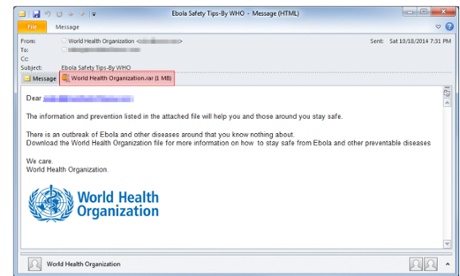Ebola advice emails from “World Health Organization” are malware spam
If you’ve got an email in your inbox from the World Health Organization offering “information and prevention” tips about Ebola, don’t click on its attachment – you’re likely to end up with a nasty digital infection.
 Cybercriminals are using the current Ebola outbreak as a topical hook for spam emails that can install malware giving them remote access to computers, including logging key presses, capturing video from webcams and stealing passwords.
Cybercriminals are using the current Ebola outbreak as a topical hook for spam emails that can install malware giving them remote access to computers, including logging key presses, capturing video from webcams and stealing passwords.
Online Security firm Trustwave’s SpiderLabs team of ethical hackers published details of the scam, noting that emails pretend to be from the World Health Organization. “The information and prevention listed in the attached file will help you and those around you stay safe,” claims one email published on SpiderLabs’ blog.
“There is an outbreak of Ebola and other diseases around that you know nothing about. Download the World Health Organization file for more information on how to stay safe from Ebola and other preventable diseases. We care.” Well, the creators of the email care about installing something called the “DarkComet Remote Access Trojan” which can run on computers “undetected by antivirus software” according to SpiderLabs.
Here comes the caveat: there’s no evidence yet that this particular spam campaign is a serious threat. “We’ve only seen one sample from this campaign so far. At this time we don’t have reason to believe it is a widespread campaign,” notes SpiderLabs’ blog post.

“The address it was sent to was an old honeypot address, so it’s not exactly targeted either. These facts taken together suggest a low volume campaign (sent to whatever address list the spammer is using) in an attempt to infect random users in the hope of gaining some data that can be used or sold.”
The more important point, though, is that any topical news event is fuel for cybercriminals, so any unexpected email in your inbox about Ebola should be treated with caution. SpiderLabs points to another campaign is pretending to offer advice from the Mexican government about Ebola prevention, for example. It also notes a recent warning from the US Department of Homeland Security’s Computer Emergency Readiness Team (US-CERT) about Ebola-related phishing and malware campaigns.
Axarhöfði 14,
110 Reykjavik, Iceland














